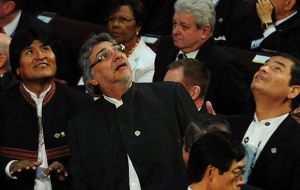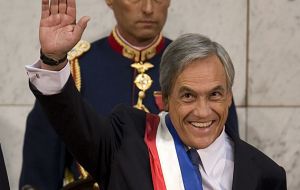MercoPress. South Atlantic News Agency
Tremors cut short Piñera inauguration and decide his agenda
 Shocked Latinamerican presidents and dignitaries look to the ceiling of Congress
Shocked Latinamerican presidents and dignitaries look to the ceiling of Congress It was to be a grand celebration, the conservatives had defeated the left leaning ruling coalition that has dominated Chilean politics since 1990 and they would be returning to office after more than half a century. But the party was not to be.
Not only an earthquake devastated mid Chile a week before, compromising the efforts and investments of the next four years but on the very solemn day, Thursday March 11 the land again shook, and several times, and buildings swayed as president elect Sebatián Piñera was heading to Congress.
Twenty one minutes before Piñera was sworn in and handed the presidential sash at congress in the port city of Valparaiso the tremors and rattling begun. Latinamerican presidents and other dignitaries looked nervously at the ceiling. Workers were briefly evacuated from swaying office towers and took refuge in the streets.
The temblors - measuring 4.9 to 6.9 on the Richter scale - caused panic in several areas across central-southern Chile. In Constitución, heavily damaged in the earlier quake, residents scrambled for the hills after the navy issued a tsunami alert for the mainland, but it was later called off. In some areas, the power supply and the telephone network broke down.
However the inaugural ceremony at the Congress building went on as planned. Bolivian President Evo Morales appeared briefly disoriented and Peru's Alan Garcia quipped that the invitees had had “a moment to dance”. Bodyguards rushed Spain's Crown Prince Felipe out once the event was over.
“It was very, very strong”, said Ecuador’s Rafael Correa walking on crouches because of a recent knee operation. Peruvian president García added that most of his peers were not accustomed to such swaying, “but in Lima it’s an everyday thing. It was an honour for me to share a seism with the Chilean people”.
As soon as the formalities were over the building was evacuated and Piñera with the presidential sash on had to suspend the carefully worded speech he had been preparing for days. A traditional meal with foreign dignitaries was also scrapped.
It was a stark reminder of the challenges Piñera faces. Half a million homes were destroyed by last month's quake, and the cost of rebuilding Chile's infrastructure, public buildings and homes has been estimated at up to 30 billion US dollars, close to 15% of the country’s GDP.
Chile has the money and know-how to cope. It has survived big earthquakes before and has the soundest economy in the region. The government has saved billions of dollars from the sale of its chief commodity, copper, for precisely this kind of emergency.
But president Piñera, the 60-year-old billionaire businessman, has acknowledged that he has had to rip up his plans for government before his tenure has begun. Many of his proposed social reforms, in the area of education for example, might now be shelved. “Ours will be a government of reconstruction,” he pledged.
As soon as he left Congress, the new president headed to Rancagua, the city closest to the epicenter of the aftershock, to survey the damage. The new interior minister changed plans and rushed back to the National Emergency Office in Santiago to monitor the aftershocks. From day one the government has to play things by ear.
Despite the enormity of the task, the earthquake aftermath could play into Piñera's hands. He is assuming office amid a tremendous outpouring of solidarity and patriotism. Chileans have donated millions of dollars to help survivors and everywhere in the capital, Santiago and other cities in rubbles, the national flag is flying. Besides, the economy seems to have finally begun to pick up with strong demand for Chilean commodities from its Asian partners.





Top Comments
Disclaimer & comment rulesCommenting for this story is now closed.
If you have a Facebook account, become a fan and comment on our Facebook Page!